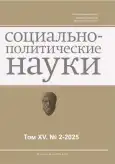Digitalization as a factor in the transformation of confrontation in the modern world
- Authors: Kazakov D.V.1
-
Affiliations:
- Military University named after Prince Aleksander Nevsky of the Ministry of Defense of the Russian Federation
- Issue: Vol 15, No 2 (2025)
- Pages: 196-203
- Section: Sociology of management
- URL: https://journals.eco-vector.com/2223-0092/article/view/681938
- DOI: https://doi.org/10.33693/2223-0092-2025-15-2-196-203
- EDN: https://elibrary.ru/PTKGLM
- ID: 681938
Cite item
Abstract
The purpose of this article is to review trends in the spheres of confrontation in the modern world caused by digitalization. Digitalization, through its technologies, is changing the structure of geopolitical and civilizational confrontation: it is forming a new bipolarity (the confrontation between the United States and China), intensifying the confrontation between technogenic and traditionalist civilizations, intensifying class contradictions and struggle, forming contradictions between the Third, Second and First waves (according to Toffler), creates the preconditions for new forms of civil war (from local to global). These trends are developing unevenly, but they have an impact on all spheres and levels of life of modern humanity.
Full Text
About the authors
Dmitry V. Kazakov
Military University named after Prince Aleksander Nevsky of the Ministry of Defense of the Russian Federation
Author for correspondence.
Email: ph.d.kazakov@mail.ru
SPIN-code: 3938-2611
adjunct, Department of Philosophy and Religious Studies
Russian Federation, Moscow
References
- Abraham D. The elements of power. Gadgets, guns, and the struggle for a sustainable future in the rare metal age. Moscow: Publishing House of Gaidar Institute, 2019. 336 p.
- Al-Shaer R. Who is against us. Moscow: Nashe Zavtra, 2023. 504 p.
- Brynjolfsson E., McAfee E. The second machine age. Moscow: AST, 2017. 384 p.
- Giridharadas A. Winners take all: The elite charade of (not) changing the world. Moscow: AST, 2024. 384 p.
- Goncharov S.N. China and Russia’s special military exploitation (February 2022 – April 2023). St. Petersburg: Nestor-Istoriya, 2024. 288 p.
- Zuboff Sh. The age of surveillance Capitalism. The fight for a human future at the new frontiers of power. Moscow: Publishing House of Gaidar Institute, 2022. 784 p.
- Carlton E. The war for Africa. Hidden shackles. Moscow: Kartina Mira, 2025. 564 p.
- Katasonov V.Yu. In the beginning was the word, and in the end will be the number. Articles and Essays. Moscow: Kislorod, 2019. 576 p.
- Cain G. The perfect police state: An undercover into China’s terrifying surveillance dystopia of the future. Moscow: Individual, 2023. 336 p.
- Lapshin A. The contours of lies. Moscow: Devastater, 2021. 200 p.
- Li Daokui D. The China’s world view: Demystifying China to prevent global conflict. Yerevan: Fortis Press, 2025. 266 p.
- Kai-Fu Lee. AI super-powers. China, Silicon Valley, and the new world order. Moscow: Mann, Ivanov and Ferber, 2019. 240 p.
- Luttwak E.N. The rise of China vs. the logic of strategy. Moscow: Russian Foundation for Lighting and Science, 2016. 288 p.
- Newitz A. Stories are weapons. Psychological warfare and the American mind. Moscow: Kartina Mira, 2024. 186 p.
- Panarin A.S. The temptation of Globalism. Moscow: Eksmo, 2003. 416 p.
- Pitron G. The third digital war: Energy and rare metals. Moscow: AST, 2021. 320 p.
- Rifkin D. The third industrial revolution: How lateral power is transforming energy, the economy, and the world. Moscow: Alpina Nonfiction, 2017. 410 p.
- Stenin V.S. Civilization and culture. St. Petersburg: SPbGUP, 2011. 408 p.
- Surak K. Golden passport. Global mobility for millionaires. Yerevan: Fortis Press, 2024. 392 p.
- Tavrovsky Yu.V. America versus China. The Celestial Empire focuses on the pandemic. Moscow: Knizhny Mir, 2020. 320 p.
- Toffler E. The third wave. Moscow: AST, 2004. 781 p.
- Utkin A.I. The New World Order. Moscow: Algorithm; Eksmo, 2006. 640 p.
- Fukuyama F. The end of history and the last man. Moscow: AST; Ermak, 2004. 588 p.
- Hauke R. From the decline of the West... To the reinvention of Europe. Moscow: Logos, 2025. 144 p. (Letterra.org project)
- Chomsky N. Profit over person. Moscow: Praksis, 2002. 256 p.
- Хуэй Ю. Вопрос о технике в Китае. Эссе о космотехнике. М.: Ад Маргинем Пресс, 2023. 320 с.
- Хуэй Ю. Искусство и космотехника. М.: ACT, 2024. 384 с.
- Читтам Т.У. Крах США. Вторая гражданская война. 2020 год. М.: Книжный мир, 2010. 224 с.
- Hui Yu. The question concerning technology in China. An essay on cosmotechnics. Moscow: Ad Marginem Press, 2023. 320 p.
- Hui Yu. Art and cosmotechnics. Moscow: AST, 2024. 384 p.
- Chittam T.O. Civil War II: The coming breakup of America. 2020. Moscow: Knizhny Mir, 2010. 224 p.
Supplementary files











